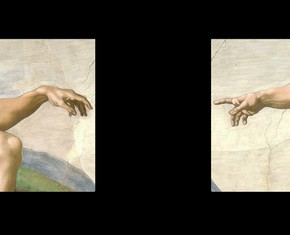The views expressed in our content reflect individual perspectives and do not represent the authoritative views of the Baha'i Faith.
Our mind is the heart of our heart as well as the seat of our mental abilities and power. With our minds, we construct reality and determine our future.
Because the way we think governs the way we act and believe, both within ourselves and with others, critically examining our thinking patterns becomes a necessity. In an age where one’s deeds speak louder than one’s words, thoughts that may lead us astray take on more significance. That’s why conducting a careful examination of the way we think can help us enormously.
So what are the most common thinking errors people tend to make?
The science of cognitive behavioral therapy—geared to changing our thought patterns with positive changes in behavior—has identified nine common errors in thinking. In this essay, we’ll look at the first five and how to avoid them; and in the next essay, we’ll explore the final four common errors.
1. Binocular Vision
 Cognitive therapists call the first common thinking error “binocular vision.” Imagine looking through a pair of binoculars—they can help you see further, but they restrict your entire field of vision by not allowing you to see everything. You can identify binocular vision by asking yourself these two questions: do I look at negative things in a way that makes them seem bigger than they really are? Do I look at good things in a way that makes them seem smaller than they really are?
Cognitive therapists call the first common thinking error “binocular vision.” Imagine looking through a pair of binoculars—they can help you see further, but they restrict your entire field of vision by not allowing you to see everything. You can identify binocular vision by asking yourself these two questions: do I look at negative things in a way that makes them seem bigger than they really are? Do I look at good things in a way that makes them seem smaller than they really are?
If you answered yes to either of those questions, you may need to work on widening the focus of your thinking, balancing your positive and negative thoughts more realistically. The Baha’i teachings recommend widening that focus by enlarging your field of vision to embrace the entire world:
… led by the light of the name of the All-Seeing God, make your escape from the darkness that surroundeth you. Let your vision be world-embracing, rather than confined to your own self. – Baha’u’llah, Gleanings from the Writings of Baha’u’llah, p. 94.
2. Black-and-White Thinking
Ask yourself: do I think about things only in extreme or opposite ways? For example, do I categorize actions or events or people as good or bad, all or none, black or white? This kind of thought pattern, which makes no allowance for the grey areas that exist in between black-and-white thinking, can trap us in our own mental prison. By definition, black-and-white thinking makes only binary choices possible, and severely limits our options in the world.
The Baha’i teachings recommend adopting a more moderate, nuanced approach to our thinking, through the use of reason and knowledge:
A good character is in the sight of God and His chosen ones and the possessors of insight, the most excellent and praiseworthy of all things, but always on condition that its center of emanation should be reason and knowledge and its base should be true moderation. – Abdu’l-Baha, The Secret of Divine Civilization, p. 59.
3. Wearing Dark or Rose-Colored Glasses
Do I think only of the bad side of things? Or do I see things in a rosy or naïve way? Sometimes we can filter our thinking through an unrealistic lens, mistaking our negative or overly positive impressions for the truth. We can take off those dark or rose-colored glasses, the Baha’i teachings suggest, by acknowledging the reality that human beings are essentially spiritual in their nature:
As for the spiritual perfections they are man’s birthright and belong to him alone of all creation. Man is, in reality, a spiritual being, and only when he lives in the spirit is he truly happy. This spiritual longing and perception belongs to all men alike … – Abdu’l-Baha, Paris Talks, p. 24.
4. Fortune-Telling
Do I make negative predictions about what will happen in the future, without enough information? Am I a pessimist? Psychologists also call this kind of thinking “catastrophizing,” and it can lead to a very dim view of the world and our place in it. Regardless of what might happen, no one can predict the future. Only an optimistic, hopeful view of future events can sustain our enthusiasm for what may come. The Baha’i teachings advise us to:
Lift up your hearts above the present and look with eyes of faith into the future! Today the seed is sown, the grain falls upon the earth, but behold the day will come when it shall rise a glorious tree and the branches thereof shall be laden with fruit. Rejoice and be glad that this day has dawned, try to realize its power, for it is indeed wonderful! – Ibid., p. 22.
5. Making It Personal
Do I make things my responsibility when I don’t need to? Do I blame myself for things I can’t control? Sometimes, we blame ourselves for things beyond our scope or ability to direct. As individuals, we’re powerless to control many of the forces that impact our lives, and recognizing that powerlessness can have a very freeing effect. The Baha’i teachings ask us to admit that we’re powerless over many of life’s vicissitudes, and to accept them as the natural boundaries of our human existence:
Were any one to soar, on whatever wings, as long as Thine own Being endureth, throughout the immensity of Thy knowledge, he would still be powerless to transgress the bounds which the contingent world hath set for him. – Baha’u’llah, Prayers and Meditations by Baha’u’llah, p. 133.
You May Also Like
Comments

















Were any one to soar, on whatever wings, as long as Thine own Being endureth, throughout the immensity of Thy knowledge, he would still be powerless to transgress the bounds which the contingent world hath set for him. – Baha’u’llah, Prayers and Meditations by Baha’u’llah, p. 133.
Thank you.